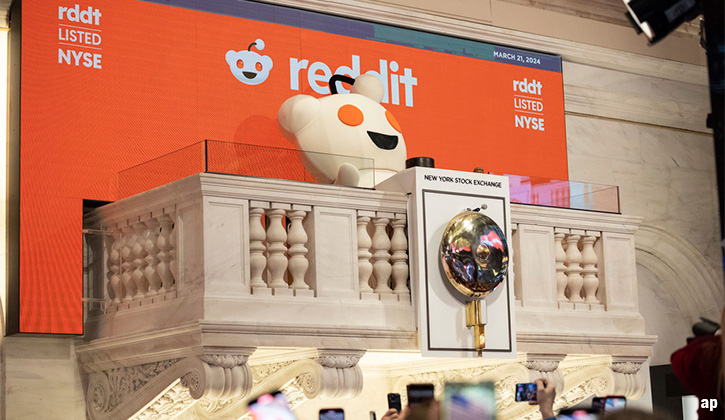:quality(80)/cloudfront-us-east-1.images.arcpublishing.com/morningstar/I6ISQOGTJRH3LOWDGQ3BZHZNPM.png)
Just over a fifth of Applied Materials AMAT shareholders voted for the chip equipment manufacturer to report on pay gaps across race and gender in its workforce.
At the company’s March 7 annual meeting, 21.1% of shareholders endorsed a proposal asking Applied to report on “quantitative median and adjusted pay gaps across race and gender.”
“The unadjusted pay gap disclosures are an indicator of racial and gender barriers to attaining higher-paying roles within the company,” writes Morningstar Sustainalytics analyst Ignacio Garcia Giner. The analyst notes that none of Applied Materials’ top five paid executive officers were women in 2023.
The resolution was filed by Arjuna Capital, on behalf of Ronald Strom and Catherine Pascal. You can find the full proposal here.
The level of support at Applied was smaller than for similar proposals at Oracle ORCL, 64.3% when adjusted for insider votes; Nike NKE, an adjusted 51.5%; and Apple AAPL, 31.1%. Still, adds Morningstar Sustainalytics analyst Andrew Spurr, “21.1% is a reasonable level of support and sends a message to the board that this is an important issue for shareholders.”
Maximus Studies Its Stance on Unionization
Shareholders are increasingly vocal about issues surrounding unions and freedom of association. Some 26% of shareholders of Maximus MMS, a Tysons, Virginia, federal contractor that operates programs for Medicaid and others, voted to approve a related proposal at Maximus’ March 12 annual meeting.
The proposal was made by Strategic Organizing Center, a coalition of labour unions including Service Employees International Union, Communications Workers of America, and United Farmworkers of America. SOC says that Maximus workers have seen retaliation and discrimination against union supporters, that employees were compelled to attend meetings where supervisors urged them to reject the union, employees were disciplined for participating in a strike, and other anti-union measures. These cases are pending before the National Labor Relations Board, according to SOC.
Maximus had urged shareholders to vote against the proposal, noting that it had begun its own process of an independent, third-party audit “regarding compliance with our freedom of association policies.” It expects to make the audit public after it is completed in the third quarter of fiscal 2024.
This year, SOC nominated directors to the Starbucks SBUX board on the ballot, and then withdrew its nominees after Starbucks and a union seeking to organize its workforce said they would create a “framework” to guide organizing. Starbucks said that “as a sign of good faith” it would give unionized workers the same benefits as nonunion workers, including getting tips from credit card transactions.
“This relatively high level” of support for SOC’s proposal at Maximus “shows that investors really care about this issue,” says analyst Giner.
TD Synnex, Keysight Technologies Face Calls for Simplicity
Should shareholders be entitled to a simple majority vote? That’s the contention of John Chevedden, a Redondo Beach, California, investor and longtime shareholder advocate. (If you’re not familiar with Chevedden, click through the Bloomberg profile below.)
Some companies require large majority approval, or supermajority votes. Chevedden wants that to change, specifically at TD Synnex SNX, which sells business process systems, and Keysight Technologies KEYS, which makes testing equipment. And he’d like the companies to make the necessary changes in plain English. Both companies hold their annual meetings on March 21.
“Supermajority voting requirements can prevent both boards and shareholders from improving corporate governance practices,” says Matteo Felleca, analyst at Morningstar Sustainalytics. “Typically, shareholder requests for simple majority voting standards enjoy substantial support, as evidenced by last year’s average support of 77% across 26 similar resolutions. Because supermajority voting requirements can obstruct the adoption of governance reforms, they can entrench poor governance practices.”
Chevedden argues that shareholders are willing to pay up for companies that are governed well. He notes that supermajority voting requirements “have been found to be one of six entrenching mechanisms that are negatively related to company performance … Supermajority requirements are used to block initiatives supported by most shareowners but opposed by a status quo management,” according to the Chevedden proposal at TD Synnex, which you can read here.
Chevedden notes that previous similar proposals won support of between 74% and 88% of shareholders at Weyerhaeuser WY, Alcoa AA, Waste Management WM, Goldman Sachs GS, FirstEnergy FE, McGraw-Hill, and Macy’s M. The topic also received “overwhelming 98%-support at the 2023 annual meetings of American Airlines AAL and Carlyle Group CG.”
“With simple majority vote it will be less difficult to adopt improvements to the governance of TD Synnex. Simple majority vote is a win for the Board of Directors, management and shareholders,” according to Chevedden.
Synnex recommends voting against the proposal. So does the Keysight board, which notes that it is already on the same page and is taking separate steps to remove its supermajority voting requirements
What Else to Look Out for During Proxy-Voting Season?
Here are some highlights from the annual Proxy Preview study, a collaboration between shareholder advocates and researchers As You Sow, Sustainable Investment Institute, and Proxy Impact.
- Climate change. This is the focus of the largest group of shareholder proposals. Most focus on disclosure, while some are on corporate political influence about climate policy. Climate transition planning and reporting is a theme. A chunk seek action and reports about general environmental issues, including how food animals are treated in supply chains. There are a total of 190 climate-related proposals in the year through mid-February, versus 160 in 2023 and 180 in 2022.
- Exxon Mobil XOM. Arjuna Capital, and its co-filer Follow This, withdrew a proposal asking Exxon to step up efforts to curb emissions, after Exxon sued them in Texas federal court, claiming they were pursuing a political agenda rather than shareholder value. Exxon hasn’t dropped the suit. In February, the Interfaith Center on Corporate Responsibility wrote Exxon’s board that the suit is “a serious threat to shareholder rights.” Exxon’s annual meeting is in May.
- Climate finance. In recent years, filers have tried to get financial institutions to finance fewer fossil fuel projects. “The big new idea in shareholder resolutions” this year, according to the report, is from New York City Comptroller Brad Lander, who proposes the five big banks disclose a “clean energy supply financing ratio.”
- Election year. Corporate political influence proposals cover election contributions, lobbying, and inconsistencies between corporate policies and the viewpoints of politicians and groups who receive corporate money. For example, two dozen proposals ask companies to explain why policies on climate change, reproductive health, voting rights, and other matters clash with the policy goals of some recipients of corporate and PAC money. Three of the proposals are resubmissions at companies where, last year, they drew strong votes: Boeing BA with 36.8%, Walt Disney DIS with 36.3%, and Wells Fargo WFC with 32.3%. In an election year, the number of proposals on political influence is about even with 2023, including board oversight over lobbying. “Corporate political misalignment is pervasive,” said Shelley Alpern, director of corporate engagement at Rhia Ventures, speaking at the Proxy Preview webinar about the report.
- Workplaces. Companies face 41 proposals on fair pay and working conditions and 22 on disclosure of workplace diversity.
- Reproductive health. There are fewer proposals on this topic this year, after the Supreme Court in 2022 struck down federal abortion protections.
- Artificial intelligence. This is the subject of 13 new proposals, mostly filed by the AFL-CIO. The main proposal asks primarily tech and media companies about the ethical principles they are employing to guide the use of AI in their businesses, according to the report.
You can find the full report here.
The author or authors do not own shares in any securities mentioned in this article.







:quality(80)/cloudfront-us-east-1.images.arcpublishing.com/morningstar/KD4XZLC72BDERAS3VXD6QM5MUY.png)













